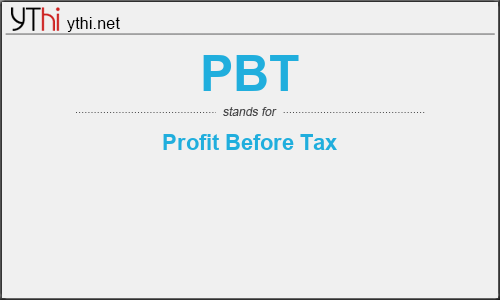What does PBT mean? What is the full form of PBT?
The full form of PBT is Profit Before Tax.
Profit before tax is a measure that looks at a company’s profits before the company has to pay corporate income tax. It essentially is all of a company’s profits without the consideration of any taxes.
Profit before tax can be found on the income statement as operating profit minus interest. Profit before tax is the value used to calculate a company’s tax obligation.
Profit before tax may also be referred to as earnings before tax (EBT) or pre-tax profit. The measure shows all of a company’s profits before tax. A run through of the income statement shows the different kinds of expenses a company must pay leading up to the operating profit calculation. Gross profit deducts costs of goods sold (COGS). Operating profit factors in both COGS and all operational expenses. Operating profit is also known as earnings before interest and tax (EBIT). After EBIT only interest and taxes remain for deduction before arriving at net income.
KEY TAKEAWAYS
- Profit before tax is the same as earnings before tax.
- Profit before tax is used to identify how much tax a company owes.
- Profit before tax can also be a profitability measure that provides for greater comparability among companies that pay a varying amount of taxes.
Calculation of Profit before Tax
Understanding the income statement can help an analyst to have a better understanding of PBT, its calculation, and its uses. The third section of the income statement focuses in on interest and tax. These deductions are taken from the summation of the second section, which results in operating profit (EBIT). Interest is an important metric that includes both a company’s interest from investments as well as interest paid out for leverage.
PBT
means
Profit Before Tax![]()
Translate Profit Before Tax to other language.


Leave a Reply
You must be logged in to post a comment.